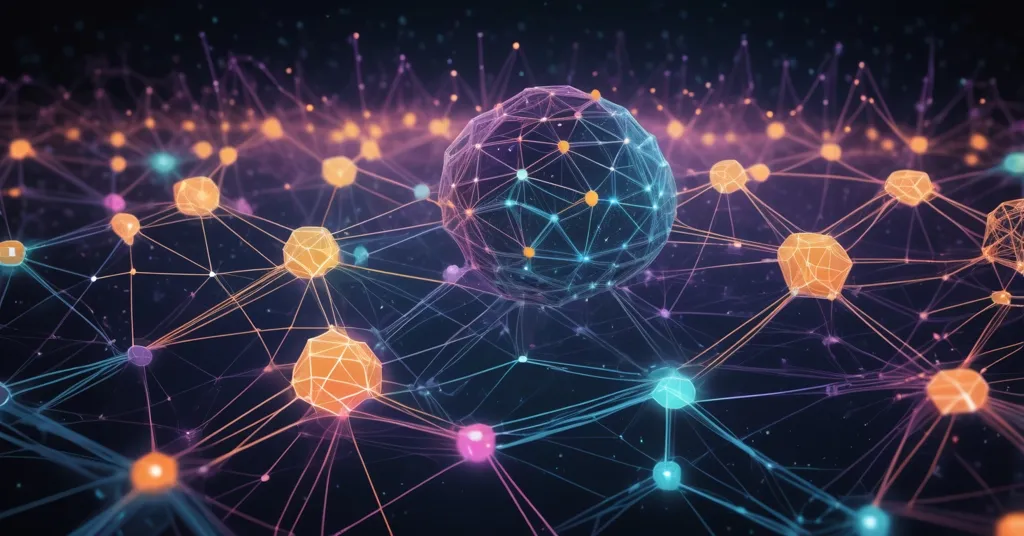Decentralized Storage: Unlocking AI’s Future with Blockchain and Edge Computing

Decentralized Storage: The Key to AI’s Next Evolution
Decentralized storage is poised to play a pivotal role in the future of artificial intelligence (AI), offering a solution to the growing challenges of data management and sustainability.
- AI market projected to reach $1,278 billion by 2028.
- Data center energy use expected to rise by 160% by 2030.
- Decentralized storage faces challenges in scalability, speed, and security.
As AI continues to expand, with a projected market value of $1,278 billion by 2028 and an annual growth rate of 28%, the need for efficient data management solutions is more pressing than ever. This growth, however, comes with significant energy demands. Data center energy use is expected to surge by 160% by 2030, primarily due to AI’s data-intensive nature. This puts a spotlight on the need for more sustainable approaches to data storage.
The Promise of Decentralized Storage
Decentralized storage systems promise a future where AI can securely store and access vast amounts of data without relying on centralized giants. These systems distribute data across multiple nodes, reducing the risk of single points of failure and enhancing data privacy and security. Ryan Levy, Head of BD and partnerships at Moonbeam and DataHaven, underscores the critical role of these systems, stating:
“Decentralized storage systems must evolve to meet these rising demands, ensuring AI’s continued success and sustainability.”
However, while the promise is enticing, decentralized storage faces its own set of hurdles. Scalability, speed, and security remain significant challenges that must be addressed to truly support AI’s evolution.
Challenges and Solutions
Scalability is perhaps the most pressing issue for decentralized storage. As AI applications grow, they require the ability to manage and store increasing volumes of data efficiently. Speed is another critical factor; AI often needs to process data in real-time, which can be challenging in a decentralized environment. Security, too, is paramount, as AI relies on the integrity of its data to make accurate decisions.
Addressing these challenges requires innovative solutions. One approach is to leverage blockchain technology, which can provide immutable records for AI data. As Levy explains:
“For decentralized storage to meet AI’s needs, it must provide data that is both verifiable and tamper-proof.”
Blockchain’s ability to ensure data integrity could be the key to unlocking the full potential of decentralized storage for AI. Yet, it’s not without its own complexities and costs, which must be carefully managed.
The Role of Blockchain and Edge Computing
Blockchain technology is not just about security; it’s also about trust. By providing an immutable ledger, blockchain can ensure that AI data remains unaltered, fostering a level of trust that is essential for AI’s reliability. This aligns with the ethos of decentralization and freedom that underpins the cryptocurrency community, particularly Bitcoin maximalists.
Edge computing offers another piece of the puzzle. By processing data near the source of data generation—think smartphones or IoT devices—edge computing can significantly reduce latency. This is crucial for AI applications that require real-time decision-making. Moreover, by distributing data storage closer to where AI applications are deployed, edge computing can lessen the burden on centralized data centers, aligning with sustainability goals.
Interoperability and AI Integration
Interoperability is essential for decentralized storage to truly support AI’s needs. As AI platforms proliferate across various industries, from healthcare to finance, decentralized storage must be able to integrate seamlessly with these diverse systems. This allows for the efficient exchange of data, enabling AI to reach its full potential across different sectors.
Consider a scenario where a healthcare AI platform needs to access data from a financial AI system to predict patient outcomes based on economic factors. Interoperability allows these systems to communicate effectively, enhancing the overall capabilities of AI. Yet, achieving this interoperability in a decentralized environment is no small feat and requires ongoing innovation and collaboration.
Impact on Cryptocurrency Ecosystem
While Bitcoin itself may not directly benefit from advancements in decentralized storage for AI, the broader cryptocurrency ecosystem certainly stands to gain. Altcoins and other innovative protocols can fill niches that Bitcoin might not serve as effectively, particularly in areas like data storage and management.
Decentralized storage aligns with the core values of the cryptocurrency community—decentralization, freedom, and privacy. As these technologies evolve, they could drive further adoption of cryptocurrencies by demonstrating the practical benefits of a decentralized approach to data management.
Counterpoints and Realistic Expectations
While the potential of decentralized storage for AI is exciting, it’s crucial to maintain a balanced perspective. The technology is not a silver bullet, and the hype around it must be tempered with realistic assessments of its current capabilities and limitations.
Critics argue that decentralized storage can be slower and more complex to implement than centralized solutions. There’s also the concern of cost; while decentralized systems can reduce the need for expensive centralized infrastructure, the overhead of maintaining a distributed network can be significant.
Moreover, as we champion the potential of decentralization, we must remain vigilant against the pitfalls of overpromising and underdelivering. The road ahead requires a concerted effort to refine and enhance these systems, acknowledging the challenges and working tirelessly to overcome them.
Conclusion
The integration of decentralized storage with AI holds immense promise for revolutionizing industries and addressing sustainability concerns. As AI continues to evolve, decentralized technologies could be the key to unlocking its full potential. However, this journey requires a balanced approach, recognizing both the opportunities and the challenges. Will decentralized storage be the backbone of AI innovation, or just another tech trend?
Key Questions and Takeaways
- What is the projected market value of AI by 2028?
The projected market value of AI by 2028 is $1,278 billion.
- How much is data center energy use expected to increase by 2030 due to AI?
Data center energy use is expected to rise by 160% by 2030 due to AI’s growth.
- What are the main challenges faced by decentralized storage systems in supporting AI?
The main challenges are scalability, speed, and security.
- How can blockchain technology benefit decentralized storage for AI?
Blockchain technology can provide immutable records, ensuring data is verifiable and tamper-proof, which is crucial for AI’s reliability.
- Why is interoperability important for decentralized storage in the context of AI?
Interoperability allows decentralized storage to integrate with various AI platforms, enabling seamless data exchange and supporting AI’s full potential.
- What role does edge computing play in decentralized storage for AI?
Edge computing minimizes latency by distributing data storage closer to AI applications, supporting real-time decision-making and reducing pressure on centralized data centers.



